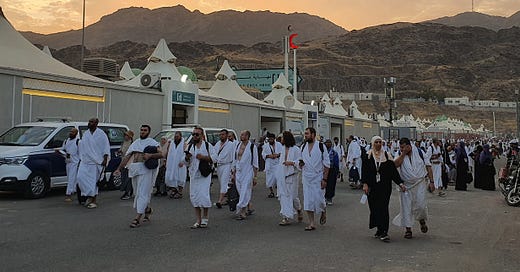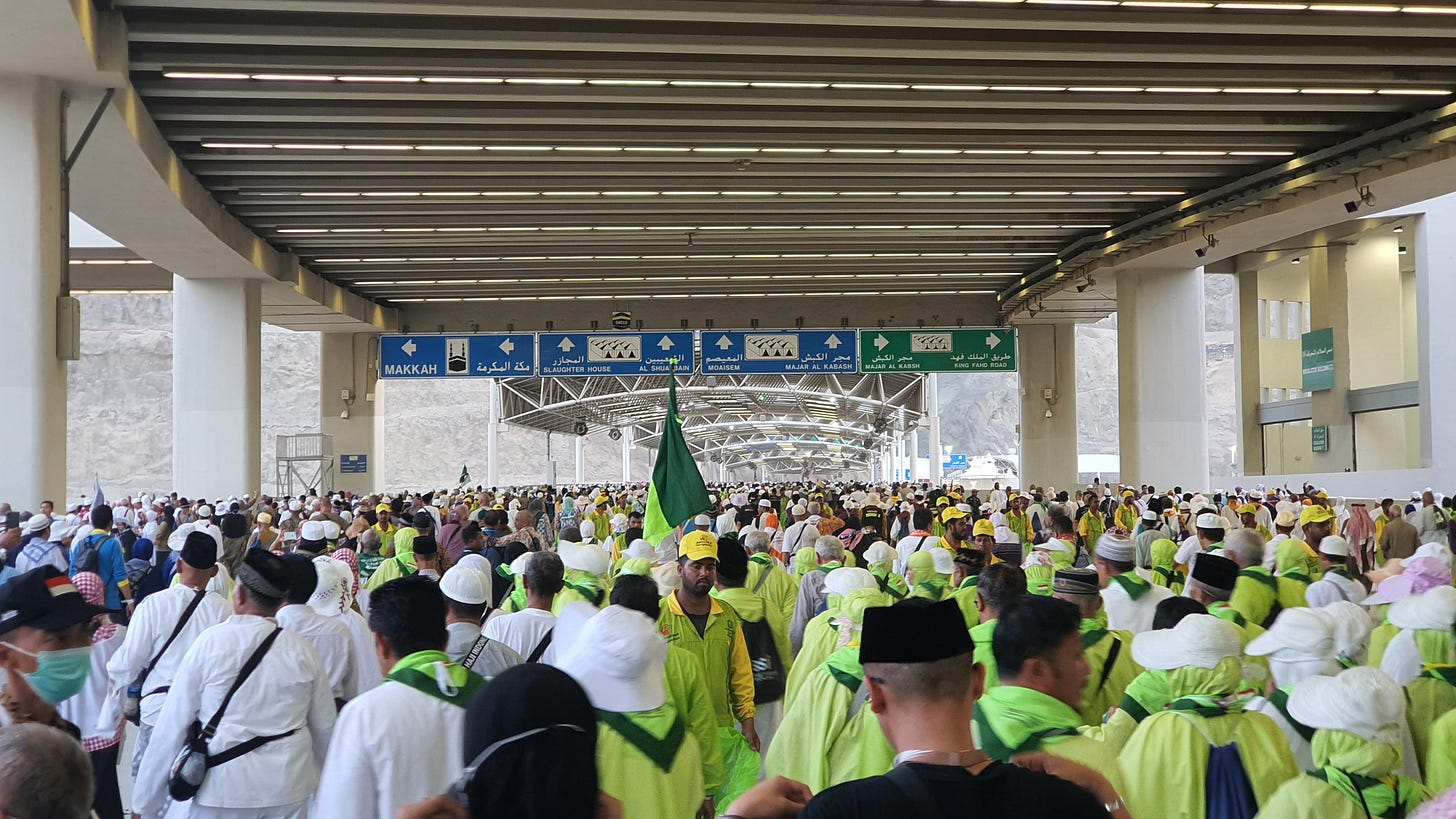Eid mubarak from Sidi Ibn Jubayr and me
Some thoughts about being in the right place at the right time
Eid al-Adha: present tense
Today is 10 D’hul Hijjah among the staunch local moonwatchers of southern Spain, of which I am one. So this morning I prayed Eid salat behind an imam at a masjid in Atarfe, a small city just outside Granada. In attendance: about 50 believers total.
Next to me on the outdoor group prayer mat were a young mom and her year-old son who had recently learned to walk. Now, most babies and young children don’t really cotton to me, but this little guy liked me. He kept tapping or patting me, and tapped me on the back while I was seated during tashahhud. Someone was clearly using him to get my attention.
At one point before salat, the little guy was wobbling about. He had found the paved central path, which was bordered by a raised cement strip. Had Sidi Baby taken a tumble the wrong way and hit his head on that strip, things would not have been good. So his mom was watching him closely, trying to guide him without being too intrusive. Alhamdulillah: no harm came to Sidi B. during the time I was there.
I was extra tired and out of spoons, so I left early. I’ve spent the rest of the day alone with my Rabb. No loved ones, no family. So it’s easy to go right into self-pity about that. However, about an hour ago, I realized: had I stayed at the gathering longer, I would likely have tripped and fallen or gotten into an argument with someone, thanks to fatigue and spoonlessness. I was being guided the whole time, just like Sidi Baby was. Ma Sha Allah.
Eid al-Adha: past tense
Medieval times
Sidi Ibn Jubayr was also in the right place at the right time. Here are some excerpts from his account of Eid al-Adha, 579 AH (1184 CE).
When the pilgrims arrived at Mina they made speed to throw seven stones on the Cairn of ‘Aqabah and then slaughtered in sacrifice, after which it became lawful for them to do everything save (to have contact with) women and (to use) scent, (from which they must still abstain) until they have performed the tawaf of the ifadah [return to Mecca]. This cairn was stoned at the rising of the sun on the Day of Sacrifice, and most of the pilgrims then left to do the tawaf of the ifadah. ... On Saturday, which was the Day of Sacrifice, the Kiswah [‘Robe’ or covering] of the holy Ka‘bah was conveyed on four camels from the encampment of the ‘Iraqi Emir to Mecca. Before it walked the new Qadi, wearing the black vestment given him by the Caliph, preceded by banners and followed by rolling drums. ... In these times the venerated House is opened daily for the foreigners of ‘Iraq and Khurasan and for those others who arrive with the ‘Iraq Emir. The throngings of these men, the way in which they hurled themselves upon the noble door, their collisions with each other, and the swimming of some over the heads of the others as if they were in a pool of water, was something that never more horrible was seen and that led to destruction of life and breaking of limbs. During all this they were unmindful of everything and never rested; rather, in an excess of emotion and animation, they hurled themselves upon that venerated House as do moths upon a lamp. The manner of the entry of the Yemenite Saru into the blessed House in the fashion we have described was staid and composed compared with that of these barbarous-tongued foreigners. Yet may God advantage them for their intentions. In that dreadful press, there perished amongst them those whose allotted term of life had come to its end. May God give pardon to them all. Sometimes a group of their women would enter the press and emerge ‘with their skins burned’ [Koran IV, 56], baked by the squeezings of a struggle that is inflamed by the gasps of emotion and ecstasy. May God, by His favour, advantage them all for their faith and sound intention.
Just last year
On being guided: I nearly messed up the stoning of the pillars last year. Now, I truly enjoyed it, so much so that I did the second stoning on my own on 11 D’hul Hijjah. Problem was: I went in the morning, and the stoning isn’t valid unless it’s done between dhuhr and ‘asr… as I found out later when my Hajj guides told me so. OOPS.
I came down with heatstroke that very afternoon. Clearly, I wasn’t going back that day for another go. Alhamdulillah: our Rabb has given us a generous set of rules for these blessed rituals. And so one of the guides cheerily did the second stoning on my behalf. (Turned out they had to do the third one on my behalf as well, because I was sick enough to warrant a return to Mina.) I was disappointed not to be able to throw those pebbles on my own, but at least my Hajj wasn’t messed up because of it.
My prayer for you
I hope you and your loved ones have benefited greatly from this most blessed of days in ways that you can see and ways that you can’t yet see.
May Allah SWT spare us all the torment of the grave and the fires of Jahannam, may our good deeds weigh heavy on the scales on Judgment Day, and may we all meet in Jannat al-Firdaus. Amin.




